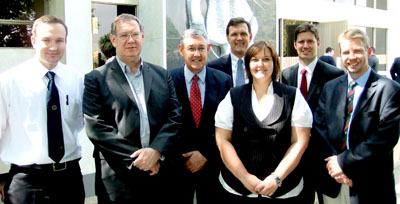Latest News Archive
Please select Category, Year, and then Month to display items
12 October 2020
|
Story Arina Engelbrecht
|
Photo Supplied
 Arina Engelbrecht from Organisational Development and Employee Well-being believes physical activity has a number of benefits for one’s health, including stress relief.
Arina Engelbrecht from Organisational Development and Employee Well-being believes physical activity has a number of benefits for one’s health, including stress relief.
Being physically active plays a big role in preventing the development of mental-health problems and in improving the quality of life of people experiencing mental-health problems.
Treatment for depression
Physical activity can be an alternative treatment for depression. It can be used as a stand-alone treatment or in combination with medication and/or psychological therapy. It promotes all kinds of changes in the brain, including neural growth, reduced inflammation, and new activity patterns are formed that promote feelings of calm and well-being. It releases endorphins – powerful chemicals in the brain that energise your spirit and make you feel good.
Physical activity can be very effective in relieving stress. Research in adults has found that physically active individuals tend to have lower stress levels compared to individuals who are less active. It also leads to improved sleep. When a person sleeps better and feels more rested, overall quality of life improves. They cope better with daily life stressors.
Reduce Alzheimer's risk
Regular physical activity can reduce your risk of developing Alzheimer's disease by up to 50%. It can also slow down further deterioration in those who have already started to develop cognitive problems. It stimulates the brain’s ability to maintain old connections as well as to make new ones.
A study asked people to rate their mood immediately after periods of physical activity (e.g. going for a walk/run, cycling, doing housework) and periods of inactivity (e.g. reading a book or watching television). Researchers found that participants felt more content, more awake, and calmer after being physically active compared to after periods of inactivity.
In conclusion, people who are physically active feel a sense of well-being, feel more energetic throughout the day, sleep better at night, have sharper memories, and feel more relaxed and positive about themselves and their lives.
“Being physically active not only changes your body, it changes your mind,
attitude, and your mood.” – Arina Engelbrecht
UFS presents Trust and Estate Planning Seminar
2010-10-04
 |
At the seminar were, from the left: Mr James Faber, Centre for Planning Law; Mr Marius Botha, independent trainer in Financial Planning; Willie van der Westhuizen, Trust and Estate specialist, Millers Attorneys; Mr Louis van Vuren from B.O.E.; Ms Shirly Hyland, Centre for Financial Planning Law; Mr Kenneth Mould, Centre for Estate Planning Law; and Dr Bradley Smith, Department of Private Law.
|
| The Centre for Estate Planning Law, in collaboration with the Centre for Financial Planning Law at the University of the Free State (UFS), recently presented their second Trust and Estate Planning Seminar.
This seminar was presented with the aim to convey new developments in the area of the law of succession, trust law and estate law in a practical manner to the public, as well as do research about relevant aspects of these disciplines. Prof. Willie van der Westhuizen, Trust and Estate specialist from Millers Attorneys was a speaker at the event and he discussed the topic, “Are trusts still useful and can it work for the advisor?”
Mr Marius Botha, independent trainer in Financial Planning, did a presentation on “The effect of abolishment of estate duty on financial planning needs”. Mr Louis van Vuren from BoE, main sponsor of the seminar, ended the afternoon with the topic “A gentle reminder of the general pitfalls in estate planning, will-drafting, estate and trust administration”.
Planning for next year’s Trust and Estate Law Colloquium, as well as has Prof. Willie van der Westhuizen’s annual Trust Law Seminar, has already started.
The seminar was attended by 90 financial planners and practising attorneys.
|